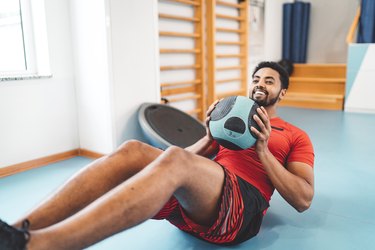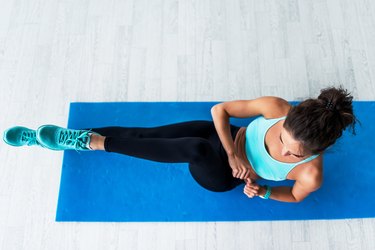
Common and usually benign, uterine fibroids can wreak havoc on your comfort and, sometimes, your health. They're a combination of muscle cells and other tissue that grow around the uterus.
The tumors themselves aren't harmful, but can grow large — from the size of a pea to a melon according to the Illinois Department of Public Health — and make life seriously uncomfortable. In some cases, the complications they cause can negatively affect a person's ability to get pregnant or the course of their pregnancy.
Video of the Day
Video of the Day
Your doctor will help you determine the best course of action to deal with your fibrosis. You can certainly use exercise to help you lose weight and flatten your stomach if your fibroids are small and not causing bloating, stomach swelling or weight gain. But if you have particularly large fibroids, they cannot be shrunk with exercise.
A Note on Language
Here at LIVESTRONG.com, we carefully consider language surrounding sex and gender. We try to avoid language that implies a sex or gender binary in favor of more inclusive language, but we sometimes include words like "men or "women" when quoting an expert or other original source material for the sake of accuracy, as is the case in this story.
Tip
Exercise helps alleviate symptoms associated with fibroids, such as lower abdominal pain and cramping during periods. You can also lose weight by exercising every day and eating a portion-controlled, mostly whole-foods diet.
Fibroids and Symptoms
Fibroids are a fact of life for many people with uteruses. Of the many fibroid statistics, 1 in 5 women experience them in their childbearing years, and 50 percent by age 50, according to Medline Plus. Hormones and genes likely determine whether you'll get them.
Many people with uteruses experience no symptoms, while others suffer considerably with heavy periods, cramping, pelvic pain, pain during intercourse, weight gain, frequent urination and extra long cycles.
Exercise Won't Help Fibroids
You can't use exercise to shrink a belly that has a uterus bloated with large fibroids. If that's the cause of your swollen tum, only a doctor's intervention can help.
Microscopic fibroids won't stop you from losing weight, however. If your stomach is large because of excessive weight resulting from an unhealthy diet and a sedentary lifestyle, you can certainly lose fat and tone your tummy with exercise.
To reach this goal:
Do at least 150 to 300 minutes of moderate-intensity cardio every week or 75 to 150 minutes of vigorous cardio activity to maintain your weight, or more if you want to lose weight says the Physical Activity Guidelines for Americans;
Perform resistance-training exercises for every major muscle group twice per week for at least 20 minutes
— using a weight that feels heavy by the last couple of efforts — for eight to 12 repetitions ;
Do ab-specific exercises, such as crunches and twists, to build abdominal muscles so you'll reveal definition when you drop pounds;
Eat a portion-controlled, mostly whole foods diet that contains lean protein, fresh vegetables, healthy unsaturated fats and occasional whole grains and fruits.
Exercise can also be helpful in relieving symptoms related to fibroids, along with diet and possible iron supplements and medication. Again, only your doctor can help you with knowing when such treatments may help.
If exercise makes you feel better and better about yourself, then indulge in a daily workout routine. Just keep your expectations under control. Exercise can make you stronger and eating a calorie-reduced diet can help you lose weight; but the flatness of your belly is also determined by the number and size of your fibroids.


